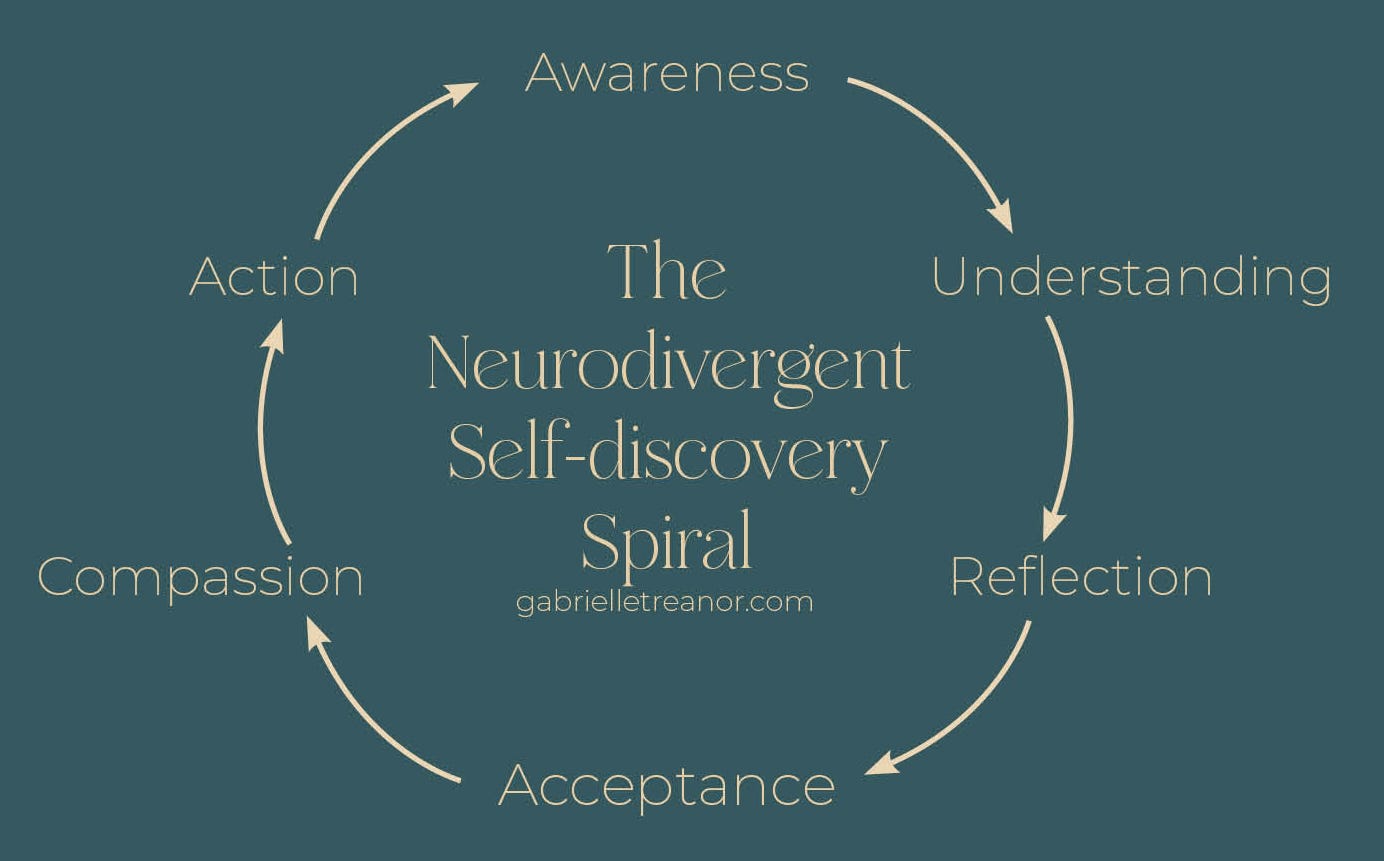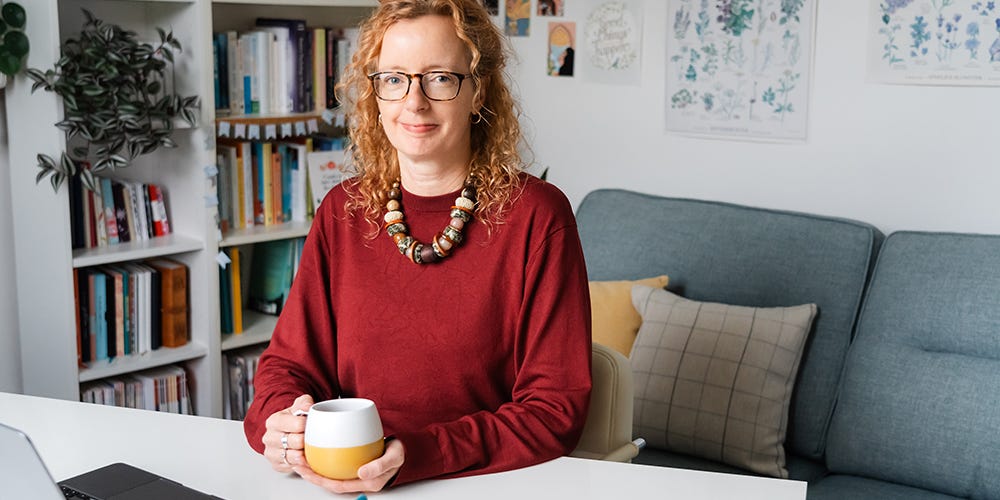Are you a part of The Quiet ADHD Club?
It’s an online space where introverted, sensitive, empathetic women who have, or think they have, ADHD can find understanding, guidance, support and connection. If you want to discover how to work with your brain (rather than fight it) and connect with other women who just get it, the Quiet ADHD Club is for you. Find out more and join here, I made it especially for you.
After I discovered I have ADHD I reflected on the process I was going through as I had realisation after realisation of how my unknown neurodivergence had coloured my experience of the first 48 years of my life. As I mulled this over a model for how we process and grow with the discovery of our differently-wired brains formed in my head.
Because it’s not a straight forward thing, realising that your brain is not of the typical variety. It brings up a whole host of thoughts and feelings and it can be quite the rollercoaster.
It’s not a linear process. It’s not easy to discover you’re neurodivergent, realise how it has and does affect your life and then carry on as before. I describe the process as a spiral because you aren’t going round in circles, ending up back at square one, it’s an ever-evolving journey through life.
As I fleshed out the model for how I see the process working I shared it with other neurodivergent folk to see if it resonated with them too and their feedback was so helpful. I’m aware that not everyone will see this as reflective of their experience, each of us is a unique individual after all.
My hope is to provide a framework that may help to describe the process you’re going through and by doing so give some explanation, encouragement and comfort.
The Neurodivergent Self-discovery Spiral
Awareness – “I’m noticing something I experience or find difficult that some others don’t”
Understanding – “There’s an explanation for why that is”
Reflection incl. grief – “Looking back I see what could have been different with this knowledge”
Acceptance – “My brain works differently, I’m not failing or wrong”
Compassion – “It’s difficult to feel/think/be this way and I need to give myself a break”
Action – “What will help me with what I’m experiencing?”
These stages are cycled through, spending more time in some than others, over and over in an upwards spiral as you process big and little realisations about your neurodivergent features and challenges. There’s no timeframe for the process and you may hop back and forth between stages before moving on to the next one. No stage is ever finished with forever, it’s a repeating process.
Let’s explore it in more detail…
Awareness – “I’m noticing something I experience or find difficult that some others don’t”
Everything begins with awareness. We can become aware in a variety of ways – we notice struggles or differences in how we think, feel, behave or process that relate to the neurodivergent rather than neurotypical experience, we recognise ourselves in others’ descriptions of their neurodivergence, or someone else suggests we may be neurodivergent, for example.
Understanding – “There’s an explanation for why that is”
This awareness leads us to understand ourselves better – we have some explanation for why we find some things difficult (or easier) than some other people do. We might dive deep into researching neurodivergence to understand ourselves better – there can be aha moments aplenty! Where we feel different, where perhaps we are criticised or made to feel wrong, too much or less then, now we’re beginning to understand why that is. And to see how society is set up to work for one type of brain.
Reflection incl. grief – “Looking back I see what could have been different with this knowledge”
This burgeoning understanding doesn’t make everything fine and dandy. As we reflect on what we’re learning, on our lives thus far (for the late discovered among us that can be several decades of life), on how we’ve been misunderstood, the criticism, the shame – all the struggles we’ve experienced – it can bring up strong feelings of grief, anger and sadness. Questions can arise and realisations be revealed – why did no-one else recognise this? How has not knowing held me back? What could life have been like if I’d had support? How can life be different now I know?
Acceptance – “My brain works differently, I’m not failing or wrong”
In time (as I said, there’s no set time frame for how long we spend in any stage as we’re each unique) we find some acceptance of this new understanding of ourselves. Life is challenging and with this knowledge we now know that it is not a fault with us, it’s that our brains are wired differently. We realise that beliefs we’ve held about ourselves, perhaps given to us by others who were as unaware as us about our brains, may not be as true as we thought. Rewriting these beliefs is not necessarily easy or speedy but we are open to seeing a new truth about ourselves.
Compassion – “It’s difficult to feel/think/be this way and I need to give myself a break”
While self-compassion is needed at every stage of this process, in every part of our lives, it can be difficult to feel when we haven’t processed a newly discovered aspect of ourselves. But by journeying through these stages we’re better able to give ourselves the compassion we may have lacked through life and which we’re in such need of now. With this knowledge we can treat ourselves with more respect, kindness and love.
Action – “What will help me with what I’m experiencing?”
We’re starting to see more clearly and look forwards with a sense of agency. This new self-discovery is suggesting there is a different way we can go about life but that doesn’t mean we have all the answers or know what to do. There is a hopeful energy to this stage as we look at where we can get help, who can support us, how we can work with our brains. We might look to work with a coach, research books, courses and funding, discuss adaptations and accommodations at home and in work, join groups, write or speak about our experiences – whatever could be supportive to us.
Round we go again
And then, as we become aware of something else new about ourselves, our brains, our neurodivergence, we cycle through the stages again, spiralling upwards each time. We may hop back and forth between some stages, the amount of time we spend in each stage before moving on and the number of times we cycle through the process is limitless.
As I say, the Neurodivergent Self-discovery Spiral is my interpretation (with feedback from other ND folk) of the process we can go through repeatedly as we realise aspects of our neurodivergence, and I’m not saying it has to be this way! I’m sharing the framework in the hope it may help you navigate the tricky waters of self-discovery and provide explanation, encouragement and comfort along the way.
I’d love to hear what you think.
If you know you’re neurodivergent, ADHD or otherwise, does this resonate?
If you’re beginning to think that you may have ADHD or be neurodivergent (there are posts below that might help) does this model feel helpful?
Share your thoughts in the comments below.
And if you want to find out how I can support you one-to-one, whether you know or think you might have ADHD, take a look at my coaching info page here.
If you’d like to share this post and the Neurodivergent Self-discovery Spiral model on social media or elsewhere I would love that, just be sure to link back to this post, and let me know where you share it so I can thank you!
Until next time,
You can click here to find out about how one-to-one coaching can support you to work with your ADHD brain, embrace your nature and your strengths, and thrive in a calm and joyful life of your design.
Whether you’re just beginning to recognise potential ADHD traits in yourself or you’re on a long waitlist for an assessment or you’ve had this self-knowledge for a while, it can be a LOT to process as you look back on how your life has been and look ahead to want you do with this information.
Go gently, you’re not alone, we’re in this together.
You may also enjoy reading…
Model diagram by me, photos by Andrea Gilpin.
Supporting quiet, introverted, sensitive, empathetic, late-discovered ADHD women find self-acceptance and understanding, as well as calm and joyful freedom to be their unique, beautiful selves.












Mm, thanks for this...I certainly recognise all those aspects, and think it would be helpful to revisit during the day - when the dog has been walked, the washing-up cleared, and all that. Time for quiet reflection, copying the spiral somewhere, a bit of painting...
Oh, I can immediately add Therapy to the actionable resources. I was lucky enough to link with a young, just qualified neuro-divergent female therapist this last nine-months. That REALLY helped...